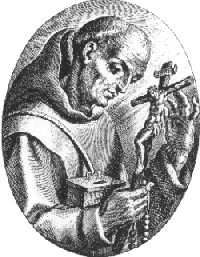
St. John of God
Born: 1495
Died: March 8, 1550
Canonized: October 16, 1690, by Pope Alexander VIII
Feast Day: March 8
Patron Saint of: booksellers, fire fighters, heart patients, hospitals, nurses, printers, publishers, sick
John was born in Montemor Noro, Portugal. As was his burning desire, he was permitted to join the Spanish army at earliest age permissible by the law to fight in the Franco-Spanish wars and against the advancing Turks. In the army, John lived a very sinful life, including a period of time as an overseer of Moroccan slaves, until his discharge from service at the age of 40. After leaving the army, he found work as a sheep herder. It wasn't until after hearing a sermon by Saint John of Avila that he came to know and love God and became deeply repentant of his former ways. This revelation was so overwhelming that he became so outwardly distraught and was thrown into a mental institution. Saint John of Avila visited him often, helping John of God overcome the despair and eventually helped secure his release.
John actively sought out missions in Africa, fully expecting to be martyred during such a dangerous time in that country's history. It took the diligent efforts of Saint John of Avila to convince John that his life would be better spent in other missions and supporting other causes - namely caring for the sick. John started a hospital in Grenada and in do so, so impressed the Archbishop that he sent John off to start up many other hospitals in regions of dire need.
At the age of 65, John jumped into a river to save a child; he developed a fever as a result of the heroic event and died. It was the Bishop of Tuy that gave John the title "John of God" and who started the rule called Brothers Hospitallers (also known as Brothers of Saint John of God) in honor of John shortly after his death. Saint John of God died, in a kneeling position, during prayer; he remained in that position until he was physically moved for burial. Witnesses to that event also reported a strong, sweet aroma in the room where he died; that smell remained well after he was removed and until his burial. It has also been reported that the distinctive odor returns every Friday at midnight and remains until nightfall Saturday. March 8, 1550, was a Saturday.






